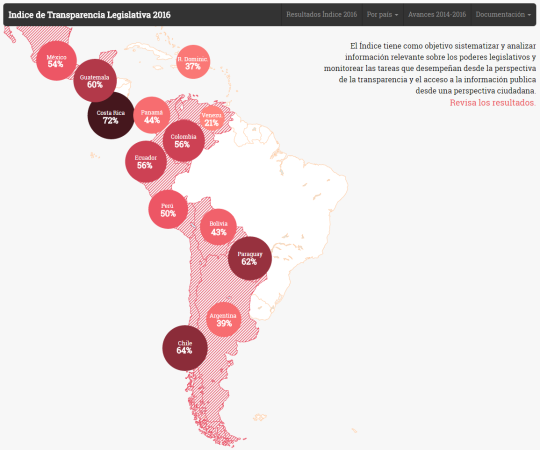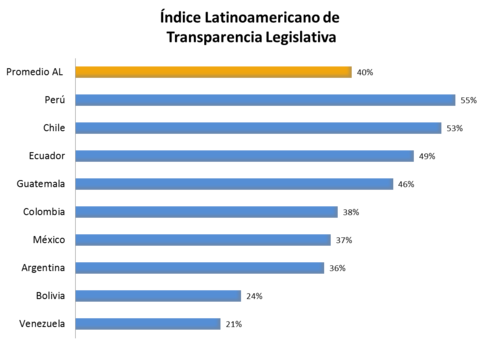Este post fue escrito por la Red Latinoamericana de Transparencia Legislativa.

Latinoamérica muestra un escenario diverso en materia de transparencia legislativa. El promedio de los 13 países evaluados por la tercera edición del Ínidce Latinoamericano de Transparencia Legislativa nos arroja un resultado de 50%, es decir, nos encontramos a mitad de camino. Los países que se ubicaron en los mejores puestos fueron Costa Rica con un 72%, Chile con el 64% y Paraguay con el 62%, mientras que Argentina (39%), República Dominicana (37%) y Venezuela (21%) se ubican en los últimos lugares.
Los estándares que el Índice evalúa fueron consensuados por las distintas organizaciones de la Red Latinoamericana por la Transparencia Legislativa y representan un nivel que consideramos exigible para todos los congresos de la Región. Avanzar en dichos estándares tiene por objetivo fortalecer a los Congresos como el espacio de deliberación democrática por excelencia a través de la apertura del proceso legislativo para efectos de aumentar los niveles de legitimidad del mismo y de sus resultados. Nos imaginamos a los congresos como el espacio donde la ciudadanía y representantes tienen la oportunidad de debatir y tomar acuerdos de forma informada, dictando normas que sean representativas de la voluntad ciudadana respecto de los principales asuntos públicos que ocupan a los países.
Son múltiples las amenazas a la democracia en nuestro continente: el hiperpresidencialismo, la demagogia, la concentración de riqueza y poder e incluso los gobiernos de facto, entre otros. Entendemos que legitimar el proceso de deliberación en los congresos es fortalecer la política democrática. Reconocer como espacios de decisión aquellos que son representativos de la diversidad que habita en nuestros países por sobre el poder concentrado en figuras o grupos específicos. La opacidad y falta de control sobre los congresos y sus miembros son elementos que han mostrado ser dañinos para la legitimidad de los mismos, con esta investigación buscamos dar luces sobre los aspectos en los que es necesario avanzar para revertir dicha situación.
